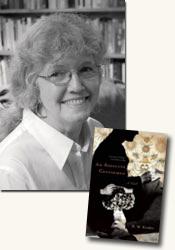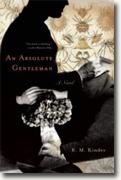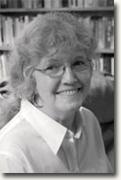author interview
book reviews:
· general fiction
· chick lit/romance
· sci-fi/fantasy
· graphic novels
· nonfiction
· audio books
· author interviews
· children's books @
curledupkids.com
· DVD reviews @
curledupdvd.com
newsletter
win books
buy online
links
home
for authors
& publishiss
for reviewers
The maga Portunista and her colorful subcommanders lead a ragged, outnumbered brigade in the wake of an international war, against her increasingly ruthless adversaries. But the ambitious commander finds herself irreconcilably drawn to a charismatic, kind and hopeful stranger. Click his e for more on Cry of Justice or read our review.
|
|||||
 
Luan Gaines interviewed author R.M. Kinder about her novel
An Absolute Gentleman Interviewer Luan Gaines: I have to confess I am fascinated by your story, especially that you chose to write a novel rather than a nonfiction account of your experience. Can you explain your reasons for putting An Absolute Gentleman R.M. Kinder: I address this very question in “Writing Arthur Blume,” an Afterword to An Absolute Gentleman Blume is hopeful about his new environment at Mason. Does starting over in an academic setting provide a false sense of security to this character? Does creating a new nest inhibit or accelerate the urge to kill? Arthur never feels secure, even though he searches for a place he may stay and hopes that Mason is that place. He’s grateful for the belated and inadequate recognition of his writing, but he’s astute enough to identify his position—low man on the totem pole. That’s why he’s not surprised when the tenured position is given to someone else. So, no, he’s not lulled by false security. He is inhibited, though. Since he murders only in the past—people who are not in his specific present tense—he must reconcile his desire to stay in Mason with his compulsion to murder. Maybe that very need to reconcile does accelerate his compulsion. I hadn’t thought so, but writers usually don’t know all the clues left in a text. When considering the animal kingdom, Blume notes that the outsider “has to become not what he’s drawn to, but what’s drawn to him.” How does this concept illustrate Arthur’s relationship with his victims? Blume believes that his victims have drawn him to them, either by presenting themselves at the wrong (and opportune) moment, or by attracting his attention by being unkind and unjust to some underling. He wants to punish those who in a position of power humiliate or hurt those in their control. It also, though, illustrates his belief that a person may have qualities better than those of the people with whom he associates, but isn’t allowed to enter the upper echelons. He places Nada in that category, and his colleagues as those stepping on her fingers. He wonders, too, what his mother might have attained without her madness. He can’t escape the sense of hierarchy. As he grows, each chapter of Arthur’s childhood reveals another clue to his psychological development. At what point does the killer recognize his true nature? Arthur knows he’s a murderer, knows he a madman, and struggles to understand why and to believe he may outrun the madness. He also justifies his murders. So he can’t know his “true nature” unless—and this is the cold point—he doesn’t believe any of the reasoning he has presented to the reader, not even the questioning of himself. Then he is an intelligent insanity never revealed, still hidden at the end of the story. There are, though, three passages in which a kind of standard self-awareness is suggested: 1) When he describes a boy’s “cruel phase.” He disclaims those experiences, though, by writing of himself in third person, then stating that the boy didn’t know if he really committed those acts or only thought he had. It’s at least a double distancing from the act. 2) The final scene with his mother. She states what he is, and he responds. 3) When he states “how can I be evil and not know it since I recognize it when I see it?” That’s true. If he can recognize it, he knows. Probably other passages raise similar questions. We all hope, I think, that such killers want to be caught and punished, but that’s likely not true, at least during some phases. They may come to that desire. Such horrific acts must destroy them from inside.
Yes, both of these are clearly possible, and he knows it. He writes of environment and of nature, so he’s examining the role of both, too. He discounts the importance of knowing who his father was because he links himself with his mother’s nature; but he also has a fictional character driven to pursue the true nature of the father. In short, Arthur has the same questions about his nature as the public does. “I’ve always believed there’s an order beyond any system that science can uncover… invisible, like an infinite web stretching over the universe.” How does this view of the world permit Blume to rationalize his behavior, to create a niche for himself? Arthur believes we’re all caught in a pattern we can’t see. Now that could be genetic—we’re driven by forces we’re far from identifying—but he attributes it to a kind of time and activity grid, in which he comes upon that act in that time. It wouldn’t have been a second or so later, if circumstances hadn’t fallen in just such a manner. But he doesn’t see that as luck. He sees that as order. In the same vein, Blume says, “If I don’t cause, but only react, then I’m not guilty of anything, especially my own pain.” What does he mean by this statement? As a child, Arthur was frightened of moving. His movement, no matter how innocuous or how solicited, might result in his own pain. So he differentiates action into that prompted by someone else with adequate clues for his reaction, and that prompted with no guidance. In both, he is only reacting. If he is harmed, he didn’t cause it; ergo, the prompter is guilty. If he harms someone, he is only reacting; ergo the prompter is guilty. It sounds quite rational. He also, though, says his murders are random. What he means is that he doesn’t plan them. They were set in motion or order without his being the first cause. Strangers and friends alike are Blume’s victims. In the mind of such a man, what qualities attract him to a particular victim? Once his attention is captured, can the inevitable be averted? Yes, the murder can be averted. Arthur himself notes what might have interfered in the past, and we see his hand stayed at least once in the present time—in a hotel room. There are also at least two murders that may not have occurred. Some readers think yes, some no. One is the first girl in the park; the other is the girl by the river when he arrives in Mason. Blume is infinitely curious about Nada Petrovich, the elderly woman who flutters about the department, either charming or irritating, depending on the individual. What is so attractive about Nada that Blume should become her champion? Does she fit his victim profile? Arthur is utterly attracted to Nada in at least two ways: she is a victim of the department community, allowing him to champion and save someone, as he couldn’t save himself; she is a motherly female, and he longed and longs for a loving mother. He says he genuinely cares for her, and I believe him. But she is a shifting entity in Arthur’s concept, and as she shifts, so must the niche in which he places her. She is also student, colleague, writer, and, as we know, a bit of sleuth herself. Nada becomes an enigma to him. The serial killer seems unable to control his compulsion to kill in Mason, polluting his nest - a mistake he has so far avoided. What does this action tell you about this particular serial killer’s evolution? Does he want to be caught? Arthur evolves in Mason because he has to. Mason, you see, is a different professional situation for Arthur, and is further complicated by the presence of Nada, a woman too complex and slippery for his niches. He’s kept off-balance by her, and then by the persistent and highly analytical Grace. Both of these women worry at him, lovingly, and make his nest rather intolerable, even when he has no place to go. Mason is his best professional opportunity. It is his worst personal one. The sheer tension may intensify his compulsion. He’s under such pressure to be a model teacher and colleague. He notes that the affair with Grace will cause enormous strain. He doesn’t want to be caught, not when he murders. Perhaps later. Arthur acknowledges an affinity to Paul Harper, a fellow teacher. Are such monsters able to identify one another, even though one may be more fully evolved than the other? Yes, I think such monsters do recognize one another. All of us recognize more than we know we do. We choose friends, lovers, employees, based on overt and subtle clues about the person’s nature. We recognize like minds. Emerson said we know when we’re in the presence of a good man. Sometimes we’re manipulated, of course, and make wrong assessments. But once we’re cued about particular traits, we’re sharper spotting them (once burned, twice shy). And we all do have a sixth sense. We just don’t trust it much because the current and long-time tendency is to classify as nutty persons who talk too much about feeling and sensing. In the Hannibal Lecter stories, the forces for good enlist the aid of Lecter because his mind is deviant and he can chase along those mental paths quicker. People who deal with psychopaths and sociopaths learn how to think like them. Profilers learn to recognize them. Well, the monster is probably even more adept at spotting someone in his own preserve. What role does Justinia play in Arthur’s world? Is she a potential victim? Justinia would be an unlikely victim of Arthur’s. She’s not devious, but openly narcissistic and a little grasping. She’s abused and yet doesn’t complain or want retribution. She’s a toy woman, I think, for Arthur. He’s not threatened by her and would have to be provoked into noting her in a major way. He thinks of her as a person more central in her absence. In critiquing Arthur’s novel, Grace Burch implies that men and women don’t see one another the same way and perhaps that’s why his novel doesn’t work as written from a woman’s perspective. Is she correct? Grace is probably correct about Arthur’s inability to write from a woman’s perspective, because Arthur has a warped view of women and cannot keep that from showing, as we see in his memoir. But a broader application of her point would be incorrect. Men can write about women with authority, as women can about men. Some experiences are universal, not limited by gender. Of course, I must believe that since I feel Arthur is true.
All of Grace’s actions could be seen as normal attempts for closeness and intimacy, but Arthur’s views of women and their natures were skewed in childhood. His boundaries were invaded by his mentally disturbed mother. Any intimacy is threatening to him - love is a warped concept for Arthur. Arthur uses the word “rooting”, but that’s an odd take on a desire to know more about one’s lover. Arthur makes cruel observations when he is tired of Grace, or she has hurt him, remarks that are devastating in their accuracy. Is this type of dispassionate observation common to men such as Arthur? I don’t know if this is common to men like Arthur or if it’s just a developed weapon for the powerless—they learn to make an innocuous statement at a perfect time to alter it from statement to barb. It’s truth used as weapon. I’ve noted it most in letters from Weeks and from another murderer now on death row (I don’t want to divulge his name). He isn’t writing to me, but I’m privy to his letters. A simple statement can be chilling in the right context. Robert Weeks used to tell me “We’ll have our time.” In retrospect, I gave that an entirely new meaning. Was it difficult to write about Arthur’s perception of women’s “little intimate aggressions” and their need to be “careful how they gain and maintain any power at all”? Does such information make us more vulnerable to the predators of the world? It’s probably pretty standard in feminist circles, if not women’s world everywhere, that female aggression has to be slow and delicate, or the aggressor will not live very long, at least not comfortably. And maintaining power is even more difficult. Arthur just seems astute on this point. He sympathizes with women in these ways because he sees himself as having to move in just those cautious steps. In his case, those slow steps to power overcame him because he was a child, with no defenses. He was betrayed in the most intimate and trusting of relationships. It’s a dual view, actually: what he suffered; what any underling suffers. He’s accurate, but his observations are well known, and thus shouldn’t be arming any potential predator. If I’m wrong, then I’ve done a disservice to women. You go into great detail about Arthur’s relationship with Grace, the subtle pressures she puts on him for personal information, the small irritations he suffers in her company. Does Grace reflect your real life experience? Yes, Grace’s probing of Arthur’s past reflects my experience with Weeks. He was very courteous but very quiet, and volunteered no information. He would answer questions but they were vague. When time passes and you don’t gain a kind of familiarity with a person, you begin to wonder why. We tend to establish ourselves as a member of a human community—a state, a high school, a teacher, a sister, aunt, best friend—names, proper nouns. But Weeks didn’t do that, and neither does Arthur. When pressed, he’ll answer, but his resistance is the main response. It was that lack of normal filled-in background that made me suspicious of Weeks, and led me to ask my ex-husband, a homicide detective, to check him out. I keep coming back to the personal cost of writing An Absolute Gentleman Writing the book was cathartic. It encapsulated a kind of fear that I couldn’t escape for a long time. I’m grateful for that. But while I don’t feel haunted, writing Arthur Blume did take its toll. I did a great deal of research, and I wanted to be fair to the human Arthur, so I dwelt in a twisted logic that began to make sense to me. At a recent gathering, I found myself explaining Arthur’s sense of justice—and defending him according to his own values, not according to mine. I understand his. I also know details about crimes that I wish I didn’t know. You can’t delete memory on whim. If certain thoughts are entertained too often, they become common, perhaps don’t have the shock value they should. Overall, I have to say that while I’m not haunted, I’m forever changed. Are you working on another novel? If so, can you share something about it with us? Two novels consume my time now: one is a study of a master manipulator—he isn’t demonic, but is driven; the other is a study of a modern witch. Both characters fascinate and surprise me. I have no idea when I’ll finish either work, but I know I will. There’s comfort in that, and pleasure in all the discovery. I’ve been asked if there’s a possible sequel to An Absolute Gentleman Do you have any advice for would-be writers? My main advice would be to value your writing, and valuing has many aspects: foremost is to begin writing, pen or computer doesn’t matter; set aside time for writing; guard that time, not religiously, but realistically, as you would any important endeavor; trust your talent and trust that it will grow; try to outwrite yourself—be in competition with yourself, not with others; choose good readers for feedback, but don’t give them too much power; read good writing, even if it’s not in the genre you aspire to write. And realize that your writing is a gift whether or not it’s ever published. Writing enables you to create worlds, to examine values, your own included, and to change what you can in that particular environment. If dreams are practice for us, then writing certainly is. It’s dreaming while awake, and making dreams for other people, too. Rose Marie Kinder, who writes under the pen name R.M. Kinder, won the 2005 University of Michigan prize for A Near-Perfect Gift, a collection of short stories. Another collection, Sweet Angel Band, was awarded the Willa Cather Award in 1991. R.M. Kinder's prose has also appeared in Other Voices, Short Story, and the New York Times. The author holds an M.F.A. and Ph.D. from the University of Arizona. She currently resides in Warrensburg, Missouri. Luan Gaines is a contributing reviewer to curledup.com. Her interview with R.M. Kinder was written in conjunction with her review of An Absolute Gentleman. © Luan Gaines/2008.
|
|||||
| fiction · sf/f · comic books · nonfiction · audio newsletter · free book contest · buy books online review index · links · · authors & publishiss reviewers |
|
| site by ELBO Computing Resources, Inc. | |


